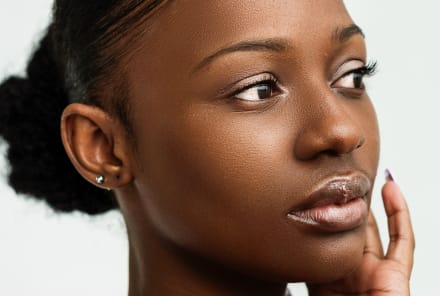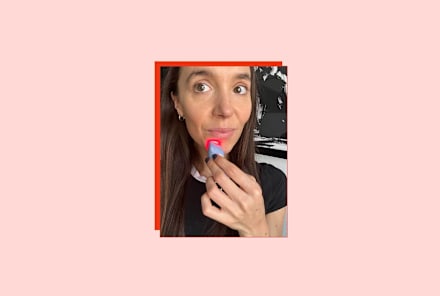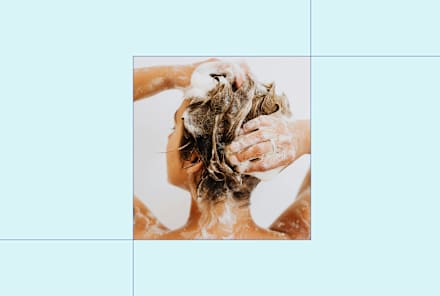Advertisement
The Skin Microbiome: Why Skin Barrier Function Will & Should Be Top Of Mind


Skin—being outward-facing and therefore open to aesthetic scrutiny—is often seen as a means to an end. If I just brighten my dark spots, I'll be happy with my skin, you might say in the mirror. Or, Once I clear up my acne, I'll feel better about my complexion, and If I just smooth out these lines, my skin will look better or any number of common complaints about the skin.
Now, we fundamentally believe there is nothing wrong with tending to personal skin complaints—we all do it, and there's always a benefit to making yourself feel more confident in yourself. However, when we only view our skin as an aesthetic entity, we forget the purpose of the organ.
"As the largest and most visible organ, the skin not only gives clues into what's happening beneath the surface in terms of immune function, nutrition, oxidative stress, and metabolic issues, to name a few, it's the body's first line of defense against infection, environmental stressors, and loss of nutrients and water, so addressing the skin is a gateway to overall health and well-being," says board-certified dermatologist Keira Barr, M.D. "The skin microbiome is constantly interacting with our environment and works to support our health by protecting against infection, influencing the immune response, protecting against UV radiation, and helps provide nourishment to the skin cells."
And in our new normal, in some ways defined by hyper-sterilization, the importance of our biome is a new lifeline: We need a healthy set of diverse organisms more than ever—and yet we are increasingly putting it at risk. So let 2021 be the year we start actually treating our skin like a barrier.
Your skin barrier and microbiome are complex things.
Perhaps one reason we tend not to think of our skin's primary role as a barrier is that it's complex, confusing, and honestly, not totally well understood. It's always easier to talk about what we do know.
Here's a briefer on the most basic level in regard to your barrier function: Your skin contains lipids (called ceramides) that act as the sealant, keeping moisture in and environmental aggressors out. These are found in the epidermis (outer layer of the skin) and make up about 50% of this layer. The outermost end of this layer is a film primarily made up of dead skin cells called the stratum corneum. (Often in beauty, we talk about scrubbing away dead skin cells, and while we should exfoliate to remove any excess that may cause buildup, you can't and shouldn't remove all of them as they provide a valuable service—shielding the young, healthy skin cells below from free radicals and so on.) There's also the skin microbiome, one of the most valuable assets your skin has as a means of protection—and yet it is the least understood. However, we know that having balanced skin flora helps your body crowd out potential pathogens on the skin.
And that's just skimming the surface. Once we start to look at the nuanced interactions between all of these systems, we start to see just how complex this all is.
For example, researchers used to think that organisms only lived at the surface, but after an eye-opening deep dive, they found that the flora extend all the way to the subepidermal fat layer1, where these critters intimately communicate with your internal immune system. (Meaning, we'd like to picture our skin neatly as going: Dermis, epidermis including the stratum corneum, and then our microbiome, but it's not—the microbiome lives in all layers.) Or a 2019 study that said in repairing the skin barrier function through moisture-retaining topicals, they found a significant drop in pro-inflammatory cytokines in the blood. This highlights the importance of the skin's protective role: Namely, that poor barrier function isn't just linked to poor skin health, it may be linked to poor overall health.
And we can't stress this enough: We are just getting started in understanding what our skin and microbiome do for our bodies.
Modern lifestyle gets in the way of your skin's primary function.
So that's your skin barrier when it's functioning optimally. But here's the problem: For so many of us—and increasingly so—it's not.
The issue is there's so much in our current skin care routines that actively harms our biodiversity. "Various factors including ingredients in topical skin care products, household products, and cosmetics can disrupt the microbiome and trigger or exacerbate conditions like atopic dermatitis, psoriasis, seborrheic dermatitis, acne, and even accelerated aging," says Barr.
Sulfates and strong surfactants blast away organisms, targeting the bad ones but harming the good ones in the process. Potent preservatives—like parabens and formaldehyde-releasing preservatives, which are put in products to help keep formulas safe from harmful bacteria and mold—have the potential to kill organisms on our skin as well. Overly aggressive routines and exfoliators in overdrive can weaken our skin by eroding the barrier's protective layers and shifting the natural pH.
Our lifestyles, too, are affecting our biomes. Much of our skin's biodiversity used to come from interacting with nature. In fact, a fairly robust 2017 report published in the World Allergy Organization Journal revealed just how intimately connected the two are2, noting that to find "the best chance of improving both human and environmental health for future generations" we needed to "move forward with nature" essentially striking a balance between "technology and modern conveniences" while pursuing a primary focus on "ecological justice which ensures more equitable access to healthy natural environments."
All of this is showing up in our skin: Studies are showing that inflammatory skin conditions are on the rise, and researchers are connecting this to our weakened microbiomes. One released in April of this year found that those with markers of sensitive skin had dramatically less biodiversity in their skin flora than those whose skin was more resilient. Another published in June found that rosacea is linked to bacteria imbalances in the skin. Finally, several recent studies published in the last year have revealed that eczema and your biome are deeply connected3.
The skin care industry is taking note.
As we better understand our complex outer organ, the skin care industry is course-correcting. Not only are they starting to make changes to existing products so they are not as stripping of the barrier, but they are producing more and more new products that are specifically targeted at the microbiome.
"No new skin care product that comes to market can claim to benefit the skin without keeping the microbiome in mind, using ingredients that support a healthy microbiome and avoiding ingredients that disrupt or damage the microbiome," says board-certified dermatologist Whitney Bowe, M.D.
Now, biotic-infused products aren't necessarily new: They've been on the market for a while now, but the breadth and variety of formulas and innovations that we are seeing certainly is. Not to mention the market growth: A recent market research report noted that the skin microbiome product market hovered around $541.1 million in 2019. Astonishingly it is anticipated to grow over $2.97 billion by 2030. This is a growth rate of 15% every year for the next decade.
And as we've seen with countless other skin care concepts before: As we learn more, so does the consumer. "Brand will become more transparent regarding whether they are using prebiotics, probiotics, or postbiotics, as consumers are getting more savvy about these terms and demanding more honesty in terms of marketing surrounding the microbiome," says Bowe.
Your skin (and hands) are your front-line defense.
In the age of COVID-19, we'd be remiss not to mention your hands, those precious delicate things. Hands are your front-line defense: For starters, they interact with the most, meaning they have the most potential to pick up pathogens. (Because of your hands' unique role, research shows they even have a very unique micro-niche flora4.) They are also the part of the bodies where your microbiome is most under attack.
Before we dive in, we must note: You need to wash your hands and use hand sanitizer right now. These habits keep us safe from COVID-19 and are not up for debate. However, you must also place just as much of a priority on rebalancing and replenishing your skin barrier and microbiome after the fact.
"Hand sanitizers that are effective at preventing the transmission of COVID-19 are, by definition, biome-unfriendly. To kill the virus we are all trying to protect ourselves from, they must contain alcohols, which are incredibly effective germ killers, meaning they can kill many disease-causing bacteria and viruses within seconds," says Bowe. "The problem is these types of alcohols do major damage to the natural lipids and fatty acids on the surface of your skin, so they damage your skin barrier." And when you're out and about, they may be your only option—so your best bet is finding a sanitizer buffered with soothing and hydrating actives, like aloe vera or glycerin, or using one that is the minimum CDC alcohol requirement to prohibit drying out.
"We know that the microbiome is proven to be critically important for our health, and using products that can disrupt the microbiome is concerning. At this point, we do not know the long-term ramifications or how significant the impact might be of this behavior," says Barr.
And while hand-washing is decidedly better for your skin, it can be incredibly drying and damaging for your skin if you're not careful. "Ideal hand soaps are made without harsh sulfates like sodium lauryl sulfate that can damage the skin barrier. I also love seeing hand soaps that are enriched with soothing, hydrating ingredients like milk, aloe, honey, and oatmeal," says Bowe. "Also, any ingredients that restore the barrier and help bring the pH back to the normal range (slightly acidic) are imperative. Our skin has an invisible layer called the acid mantle, and we need to respect the pH of our skin to keep it healthy."
So while you should be diligent about hand-washing, do be just as mindful about repair with hand creams. "It's essential to moisturize as often as possible to restore those lipids and encourage the regrowth of healthy bacteria," says Bowe. "I carry a hand moisturizer with me at all times and apply it within moments of washing or sanitizing my hands throughout the day. If you wait too long, you miss that narrow window of opportunity to really trap and seal those nourishing ingredients in the skin before all the water evaporates off the surface, further compromising your skin."
The takeaway.
As we wade into this uncharted territory, we are learning just how important our skin is to our internal and overall health. Each development brings new revelations that may be the key to optimal skin health. And not only will we be able to use these developments to heal skin woes like acne, rosacea, eczema, and premature aging, but we'll be better suited to protect our bodies.
Watch Next
Enjoy some of our favorite clips from classes
Enjoy some of our favorite clips from classes
What Is Meditation?
Mindfulness/Spirituality | Light Watkins
Box Breathing
Mindfulness/Spirituality | Gwen Dittmar
What Breathwork Can Address
Mindfulness/Spirituality | Gwen Dittmar
The 8 Limbs of Yoga - What is Asana?
Yoga | Caley Alyssa
Two Standing Postures to Open Up Tight Hips
Yoga | Caley Alyssa
How Plants Can Optimize Athletic Performance
Nutrition | Rich Roll
What to Eat Before a Workout
Nutrition | Rich Roll
How Ayurveda Helps Us Navigate Modern Life
Nutrition | Sahara Rose
Messages About Love & Relationships
Love & Relationships | Esther Perel
Love Languages
Love & Relationships | Esther Perel
What Is Meditation?
Box Breathing
What Breathwork Can Address
The 8 Limbs of Yoga - What is Asana?
Two Standing Postures to Open Up Tight Hips
How Plants Can Optimize Athletic Performance
What to Eat Before a Workout
How Ayurveda Helps Us Navigate Modern Life
Messages About Love & Relationships
Love Languages
Advertisement

We Need To Talk About Toxic Femininity In Beauty: Ever Encounter These Examples?
Perpetua Neo, DClinPsy

We Need To Talk About Toxic Femininity In Beauty: Ever Encounter These Examples?
Perpetua Neo, DClinPsy

We Need To Talk About Toxic Femininity In Beauty: Ever Encounter These Examples?
Perpetua Neo, DClinPsy

We Need To Talk About Toxic Femininity In Beauty: Ever Encounter These Examples?
Perpetua Neo, DClinPsy









